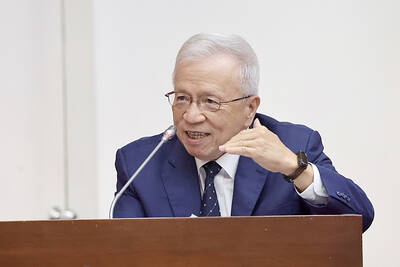Prices of newly built homes and pre-sale projects in cities and counties in northern Taiwan generally increased slightly in the fourth quarter of last year, indicating a stable property market in those areas, the Chinese-language Housing Monthly (住展雜誌) said.
Data compiled by the magazine covered Taipei, New Taipei City, Taoyuan, Keelung and Hsinchu City, and the counties of Hsinchu and Yilan, which account for more than 50 percent of the total residential and commercial property transactions in the country.
Home prices in Taipei averaged NT$851,000 (US$27,607) per ping (3.3m2), up 2.28 percent from a quarter earlier and 2.16 percent from a year earlier.
It was the first time that home prices in Taiwan have recorded year-on-year growth since the second half of 2014, Housing Monthly research manager Ho Shih-chang (何世昌) said in a statement on Thursday last week.
Prices of newly built homes and units in pre-sale projects moved higher in Taipei in the fourth quarter, Ho said.
In New Taipei City, home prices averaged NT$385,000 per ping, up 1.85 percent quarter-on-quarter, but little changed from a year earlier, the data showed.
The quarter-on-quarter price growth in certain districts, such as Banciao (板橋), Tucheng (土城), Luzhou (蘆洲), Jhonghe (中和), Yonghe (永和) and Tamsui (淡水), appeared more apparent last quarter, Ho said.
Home prices in Taoyuan hit NT$226,000 per ping on average, up 2.73 percent quarterly, but down 0.44 percent annually, with the magazine attributing the quarterly price increase to a decline in the number of homes put up for sale.
In Keelung, home prices averaged NT$209,000 per ping, a quarterly increase of 1.95 percent and an annual increase of 6.63 percent, while those in Hsinchu reached NT$229,000 per ping, up 1.73 percent from a quarter earlier, but unchanged from a year earlier.
Yilan was the only area in northern Taiwan to see home prices fall quarterly and annually to average NT$212,000 per ping, down 0.9 percent from a quarter earlier and 7.8 percent from a year earlier.

JITTERS: Nexperia has a 20 percent market share for chips powering simpler features such as window controls, and changing supply chains could take years European carmakers are looking into ways to scratch components made with parts from China, spooked by deepening geopolitical spats playing out through chipmaker Nexperia BV and Beijing’s export controls on rare earths. To protect operations from trade ructions, several automakers are pushing major suppliers to find permanent alternatives to Chinese semiconductors, people familiar with the matter said. The industry is considering broader changes to its supply chain to adapt to shifting geopolitics, Europe’s main suppliers lobby CLEPA head Matthias Zink said. “We had some indications already — questions like: ‘How can you supply me without this dependency on China?’” Zink, who also

At least US$50 million for the freedom of an Emirati sheikh: That is the king’s ransom paid two weeks ago to militants linked to al-Qaeda who are pushing to topple the Malian government and impose Islamic law. Alongside a crippling fuel blockade, the Group for the Support of Islam and Muslims (JNIM) has made kidnapping wealthy foreigners for a ransom a pillar of its strategy of “economic jihad.” Its goal: Oust the junta, which has struggled to contain Mali’s decade-long insurgency since taking power following back-to-back coups in 2020 and 2021, by scaring away investors and paralyzing the west African country’s economy.

BUST FEARS: While a KMT legislator asked if an AI bubble could affect Taiwan, the DGBAS minister said the sector appears on track to continue growing The local property market has cooled down moderately following a series of credit control measures designed to contain speculation, the central bank said yesterday, while remaining tight-lipped about potential rule relaxations. Lawmakers in a meeting of the legislature’s Finance Committee voiced concerns to central bank officials that the credit control measures have adversely affected the government’s tax income and small and medium-sized property developers, with limited positive effects. Housing prices have been climbing since 2016, even when the central bank imposed its first set of control measures in 2020, Chinese Nationalist Party (KMT) Legislator Lo Ting-wei (羅廷瑋) said. “Since the second half of

AI BOOST: Next year, the cloud and networking product business is expected to remain a key revenue pillar for the company, Hon Hai chairman Young Liu said Manufacturing giant Hon Hai Precision Industry Co (鴻海精密) yesterday posted its best third-quarter profit in the company’s history, backed by strong demand for artificial intelligence (AI) servers. Net profit expanded 17 percent annually to NT$57.67 billion (US$1.86 billion) from NT$44.36 billion, the company said. On a quarterly basis, net profit soared 30 percent from NT$44.36 billion, it said. Hon Hai, which is Apple Inc’s primary iPhone assembler and makes servers powered by Nvidia Corp’s AI accelerators, said earnings per share expanded to NT$4.15 from NT$3.55 a year earlier and NT$3.19 in the second quarter. Gross margin improved to 6.35 percent,